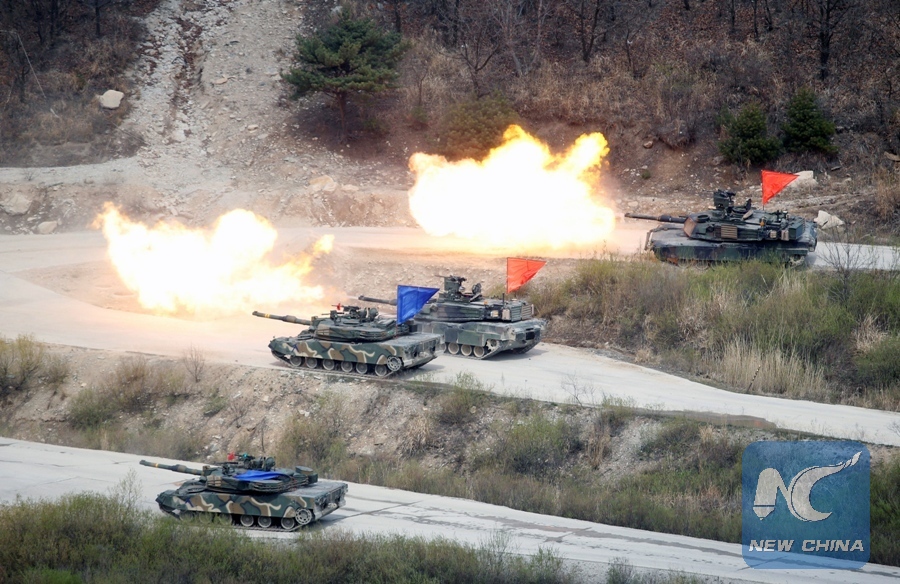
Picture taken on April 21, 2017 shows South Korean Army K1A1 and U.S. Army M1A2 tanks fire live rounds during a U.S.-South Korea joint live-fire military exercise, at a training field, near the demilitarized zone, separating the two Koreas in Pocheon, South Korea. (Xinhua/REUTERS)
by Matthew Rusling
WASHINGTON, Sept. 29 (Xinhua) -- The United States is gearing up for even more weapons sales to allies, after months of already increased arms sales worldwide.
At a time when tensions around the world are on the rise, the administration of U.S. President Donald Trump is preparing to ease restrictions on weapons sales to U.S. allies, the U.S. news source Politico reported Friday.
The changes, which could see the U.S. State Department and Pentagon playing a more active role on behalf of U.S. weapons manufacturers, will be included in an executive order this fall, Politico reported.
That is a stark change from the previous administration, which sought to set limits on the export of weapons from the United States, the world's biggest arms exporter.
Indeed, new data finds that U.S. arms sales have nearly doubled, to 48 billion U.S. dollars, over the last eight months since Trump came to office, compared with the same period last year, Politico reported.
Much of the reason is that the White House wants to bump up U.S. trade and boost the economy. But a surge in U.S. weapons sales also comes amid growing global tensions, and some experts fret that all this could have a destabilizing effect.
"Much of the increase in arms sales is driven both by the Trump administration's concern about security in (certain) areas, as well as a desire to boost U.S. exports, even for weapons producers," Dan Mahaffee, senior vice president and director of policy at the Center for the Study of Congress and the Presidency, told Xinhua.
"In these regions where there are increased arms sales, it reflects the Trump administration's concerns about regional stability, as well as the desire to increase partners' capabilities and reduce their reliance on the U.S. military," Mahaffee said.
"In the Middle East, much of the capacity-building and weapons sales efforts are focused on better-equipping Gulf Arab allies to be able to contain Iran," Mahaffee said, referring to U.S. tensions with the Islamic Republic.
Similarly, Asian allies will likely have access to weapons sales, considering tensions on the Korean Peninsula and U.S. desires to create a stronger security architecture in that region, Mahaffee said.
Experts have differing views on whether the uptick could have unintended consequences, such as making the world a more dangerous place as nations beef up their weapons arsenals.
"I understand some of the concerns that tensions could increase or arms races could result, but improving the capabilities of U.S. allies is key to deterring some of these tensions," Mahaffee said.
Brookings Institution Senior Fellow Darrell West told Xinhua that Trump has the U.S. economy in mind.
"Trump is ramping up weapon sales as a way to boost the economy. He sees this as a valuable export and an avenue for companies to increase their markets. In general, Trump is pro-military so this is in keeping with his philosophic bent," said West.
"The risk is that increased weapon sales will destabilize the world," West added. "Putting more military equipment into the hands of governments could increase conflict and lead to a global arms race."

